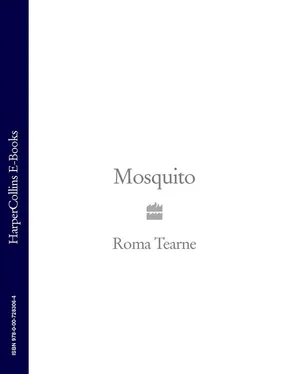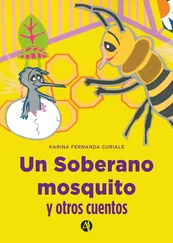The many-handed god watched them all. He watched the backs of the women bent in devotion. Who knew what they prayed for? Was it for abundance in their wombs? Or was it simply peace for the fruits of these same wombs that they desired? The crowds came with their coins tied in cloth, with their ribbons of desires, their cotton-white grief and their food. As night approached a full moon arose across the neon sky silhouetting the dagoba, white and round, with a single spike pointing at the stars. Hundreds of coconut flames fanned an unrelenting heat.
Midnight approached and the temple drums grew louder, announcing the arrival of the Kathakali Man of Dance. The crowds gasped. With his pleated trousers and beaded breastplates, the Kathakali Man pointed his fingers skywards. He seemed to be reaching for the stars. With ancient gesture and sandstone smile, he danced for the gaping, amazed gathering. The Kathakali Man had a many-faceted jewel that gleamed in his navel and a peacock’s cry deep in his throat. His drum tattooed yet another ancient tale, telling of those things which were allowed and those which were forbidden. His was a dance of warning. History ran through his veins, giving him authority. Everyone heard him in the neon-green night but not everyone was capable of interpreting what he said. Those who ignored him did so at their peril, he warned.
Long ago, in the days before the trouble, people from England used to come to see him. They came simply because they knew they could find native colour and because, in this sacred place, even the statues smiled. They did not understand the real meaning of a sacred site. They came for rest, for healing herbs and pungent oils. And sometimes the many-handed god welcomed them, and sometimes he did not. Now that the troubles were here no one came from England. Nothing but a steady stream of hope walked through the jungle to the dagoba. Nothing but despair showed through the brave colours of the processions.
Sugi stood in the crowds watching the festival. He was waiting for his relatives. While he waited he looked around him to see if there were others he knew. He noticed Mrs Mendis. Ah, observed Sugi, she is here for her son Lucky Jim. Born with the kernel of luck that Mrs Mendis protected with the husk of her own life. No doubt she wanted the kernel to grow. She’s a true believer and so she knows, true believers had a better chance. She wants nothing for herself, thought Sugi. But then, he noticed, Mrs Mendis had forgotten about her daughter. Sorrow, like too much sun, has blinded her. Mrs Mendis left her clay curd pots, her crimson flowering pineapple and her kiribath , milk rice, at the feet of the god. Without a doubt, thought Sugi, watching silently, the god will grant her wish. For it must surely have been decided in another life that Jim’s luck could only grow. Then Sugi glanced at Nulani Mendis. The child was lost in thought. What future will she have? he wondered, pity flooding his heart. With a mother like this! Sugi had been watching the girl for months. He was astonished at how she had changed. When she had first come to the beach house she had been silent and unhappy. Then slowly she had begun to blossom. In the beginning, he remembered, her unhappiness had blotted out her light. But gradually she changed. Her eyes shone, she laughed. And she talked all the time. Sometimes she drove Sir mad, Sugi knew. Sometimes they would exchange looks of amusement. And recently, thought Sugi, pensive now, Sir had a different look in his eyes. But Sir himself seemed unaware of this. Only Sugi knew.
A sudden harsh sound in the trees sent a flock of iridescent blue magpies bursting into the sky as though being lifted by a gust of wind. Several people threw themselves to the ground, crying. Was this an ill omen? Sugi looked uneasily around him. There was no wind. Ancient laws were written all over this sacred site. Sugi was a man of simplicity. And he was afraid. He saw the girl ahead of him in the procession look up at the magpies. She was smiling at some secret thought of her own. Yesterday she had let Sugi look at her latest painting. It was nearly finished and was a remarkable painting, of glossy greens and quiet violets. It was full of something else as well, Sugi saw. Something Nulani Mendis had no idea of. Painting was what she had brought into this life, Sugi told himself, watching her now. It was her fate. He knew her talent would never leave her. He watched as she bent her head and prayed. He knew she was praying for her brother. And he knew there were other undiscovered longings in her heart.
The procession had brought all sorts of people out. Some of them were not the kind of people who usually went on pilgrimages. One of the people in the crowd was Vikram. Gerard had told him about the sacred site.
‘Go and see it,’ he had said. ‘Mingle, learn what goes on there. Watch the Buddhist monks and look out for the army checkpoints. You should always talk to the army. Get them used to your face. Could be useful for the future.’
And he winked at Vikram. Then he put his hand on the boy’s shoulders, never noticing how he winced, not realising Vikram did not like being touched.
So Vikram went to the festival. The anniversary of the massacre of his family was approaching. Every year around this time he had nightmares. He would wake up to the sound of grinding teeth and discover they were his own. He would wake with an erection or with his sheet wet. And, always, he would wake with a skullful of anger punctured as though by knives. In the morning he was fine again, back to his usual indifferent self, with all disturbance forgotten. But for a couple of nights, close to the anniversary of the deaths, things were bad. On these occasions, Vikram heard, quite clearly, as if from a distant part of Sumaner House, his mother’s muffled screams, his sister’s voice crying out in Tamil. Why had they cried so much? What had they hoped to achieve? Mercy, perhaps? Had they not realised they were about to die? That no amount of crying would help them in the long dark place they had reached? From where he crouched, rigid under the bed, all Vikram had seen were their hands waving in a gesture of helplessness. The hands that had held him moments before, and had stroked his head, were now waving their goodbye. From his hiding place he could see fingers threshing and flaying the air, engaged in some ancient struggle, and in his dreams, so many years later, it was this image, of those hands forever beating the air, that he still saw. Gerard had reminded Vikram that his family needed to be avenged. They were waiting for the day, Gerard said, when, like a half-finished jigsaw, they would be made whole again.
So Vikram walked through the jungle, following the sound of the drums like everyone else. Thinking his own thoughts. On the way he passed a Coca-Cola lorry and a black Morris Minor. They were tangled and smashed together in a crash. Curious, he stopped to investigate. Bodies were tossed carelessly across the overgrown path, reddish-brown liquid frothed from under the lorry. Just looking at it made Vikram thirsty. Other people had visited the site of the crash before him. They had plundered the victims, taken their money and their jewellery. There was nothing left to take. Vikram stared. One of the bodies was that of a woman. A long deep ridge exposed the tendons and muscles across one part of her face. Bone jutted out. A fountain of blood flowed from her mouth. Her hands moved feebly like an ant on its back, clawing the air. Vikram looked at her impassively. She was beginning to bloat and her lips reminded him of the blood-swollen bellies of mosquitoes he was forever swiping. But, thought Vikram walking on, she did not look in so much pain. How long would it take for her to die? he wondered idly. Would she be dead by the time he had walked two dozen steps, or half a mile? Would she be dead by the time he reached the sacred site? Vikram continued on his way, following the distant noise of drums and the monkeys that swung in front of him from tree to tree. He could hear the bells of the Kathakali dancers somewhere in the distance.
Читать дальше












